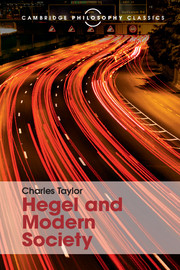1 - Freedom, reason and nature
Published online by Cambridge University Press: 05 November 2015
Summary
Expression and freedom
Hegel's philosophical synthesis took up and combined two trends of thought and sensibility which arose in his day and are still of fundamental importance in our civilization. To see why Hegel's thought remains of perennial interest we could perhaps best start by identifying these trends and recognizing their unbroken continuity into our time.
Both were reactions in late-eighteenth-century Germany to the mainstream of Enlightenment thought, in particular its French variant, and became important sources of what we know as Romanticism.
The first, which I would like to call ‘expressivism’, arises with the diffuse movement we know as the Sturm und Drang, although it continues well beyond its demise. Its most impressive early formulation comes in the work of Herder.
In a way this can be seen as a protest against the mainstream Enlightenment view of man – as both subject and object of an objectifying scientific analysis. The focus of objection was against a view of man as the subject of egoistic desires, for which nature and society provided merely the means to fulfilment. It was a philosophy which was utilitarian in its ethical outlook, atomistic in its social philosophy, analytic in its science of man, and which looked to a scientific social engineering to reorganize man and society and bring men happiness through perfect mutual adjustment.
Against this, Herder and others developed an alternative notion of man whose dominant image was rather that of an expressive object. Human life was seen as having a unity rather analogous to that of a work of art, where every part or aspect only found its proper meaning in relation to all the others. Human life unfolded from some central core – a guiding theme or inspiration – or should do so, if it were not so often blocked and distorted.
- Type
- Chapter
- Information
- Hegel and Modern Society , pp. 1 - 66Publisher: Cambridge University PressPrint publication year: 2015

